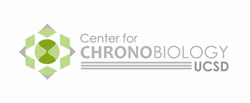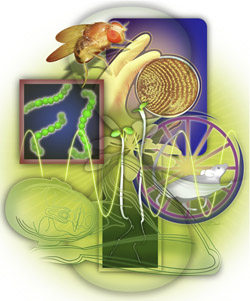UC San Diego Establishes Center for Chronobiology
MARCH 5, 2010
Media Contact: Kim McDonald (858) 534-7572
Comment: Martin Yanofsky (858)534-7299

Scientists at UC San Diego studying the biological clocks of bacteria, fungi, plants and animals have joined forces to apply their knowledge across these diverse groups of organisms to human sleep disorders in a newly established Center for Chronobiology.
Understanding the basic biology of circadian rhythms, or chronobiology, is vital to our daily lives as one half of the population suffers from some problem in their daily sleep cycle. Next Sunday's shift to Daylight Savings Time, medications, artificial lighting, shift-work, airline travel, even 24/7 internet access all represent chronobiological changes that affect our productivity and physical and mental well-being.
"The biological clock in humans plays a central role in whether we gain or lose weight, when we fall asleep and wake up, how likely we are to have accidents and how we respond to disease," said Susan Golden, a professor of biology who co-directs UCSD's Center for Chronobiology. "The researchers involved in the center will investigate the basic mechanisms of the circadian clock as well as the role of human circadian disorders in regulating the sleep-wake cycle, glucose stability and weight control with the long-term goal of developing new molecular treatments for patients suffering from disorders as diverse as insomnia, diabetes and obesity."

Golden said that what's unique about UCSD's center compared to other chronobiology research efforts across the country is that rather than focusing solely on the biology of human circadian rhythms, the UCSD center is combining what scientists learn about the biological clocks of diverse groups of organisms, from bacteria to fungi to plants, to better understand the basic biology of circadian rhythms.
As part of that effort, the center is bringing together the nation's experts on chronobiology for its first symposium on the subject, "From Cells to the Clinic," which will take place on the UCSD campus March 10 to 12.
Stuart Brody, a professor of biology and the other co-director of the center, said it's not surprising that all organisms on earth have evolved common systems of dealing with changes in the daily and seasonal cycles.
"Because life evolved on a rotating earth, itself revolving around the sun, biological systems-from the simplest cells onwards-have had to contend with conditions that markedly changed both daily and seasonally," he said. "Whereas most biological research has stressed constancy and homeostasis, chronobiology-the study of biological rhythmicity-has at its core a view of biology as inherently cyclical and interactive."
"Rhythmicity is ubiquitous and central to the organization of life," said Golden. "Chronobiology is of particular applied significance since modern society demands that people perform outside of their evolved temporal niche. Artificial lighting, shift-work, and trans-meridian jet travel all represent chronobiological novelties that affect the health and safety of millions."
For more information on the center, see the Chronobiology Website.
